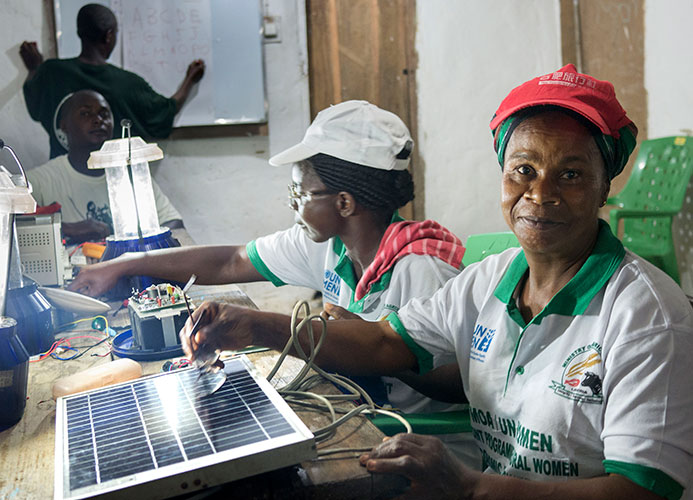How the founding principles of the United Nations can address current global challenges with bold responses, by Patricia Espinosa, Executive Secretary of the United Nations Framework Convention on Climate Change
Bonn, 25 June 2020 - The signing of the United Nations Charter in 1945 heralded a new era in human history: one defined by a consensus-driven, rules-based international order and guided by multilateralism. For a world exhausted by the impacts and horrors of two global wars, the commitment by national leaders to cooperatively address common issues based on the fundamental pillars of the UN system—peace and security, development and human rights—provided cautious hope and optimism for the future.
In the subsequent 75 years, the strength of this consensus-based order has often been tested, but the pillars have held firm. Consequently, a period of relative peace has led to significant global advances. This includes the Millennium Development Goals, in which the UN led efforts in areas crucial to human security and well-being, including the reduction of poverty, global hunger, the expansion of health programs and more. It includes the Paris Agreement, a global agreement signed in 2015 to address climate change. It also includes the 2030 Agenda for Sustainable Development, also adopted by in 2015. With it, the world has a shared blueprint for peace and prosperity for people and the planet, now and into the future. Climate change is not only one of the SDGs, but it is intricately tied to all of the other major challenges.
The arrival of the global pandemic, COVID-19, has provided the most significant challenge to nations since the end of the Second World War, resulting in an unprecedented global health crisis with severe economic and social impacts. Its repercussions are felt financially, politically, economically and beyond, but it is, first and foremost, a human tragedy; one impossible to measure in numbers, statistics and charts alone. It will continue to change the lives of people throughout the world for the foreseeable future.
In a changing world, the stability and dependability of the founding principles of the United Nations are crucial, including the need for cooperation across borders, sectors and generations, the need for rules-based international order, for multilateralism, for consensus, and for the United Nations system itself. COVID-19, after all, has not made all other global challenges disappear; it has exacerbated them. This includes climate change.
Climate and COVID-19
COVID-19 may be humanity’s greatest challenge today, but climate change remains humanity’s greatest challenge over the long term. We are reminded that planet Earth registered its second-hottest year on record in 2019. This capped off a five-year period that ranks as the warmest span in recorded history. In 2019, hurricanes, wildfires and floods cost the world $150 billion. Losses for business and the economy—before Covid-19 hit—were already expected to increase because of a decade-long rise in natural catastrophes with direct links to climate change.
While some have urged restraint on the climate change front in 2020 due to COVID-19, nothing could be further from the truth. The pandemic has not put climate change on hold, nor has it removed the proverbial sword of Damocles from above the heads of humanity. In fact, never has the need for climate ambition throughout the world been more crucial, specifically raising ambition on mitigation, adaptation and finance.
While Covid-19 may have postponed COP26, it has not postponed the need for Parties to accelerate work towards fulfilling commitments they have already made. Nor does it postpone the requirement for nations to submit or revise their national climate action plans—known as NDCs—in 2020. These plans are submitted only once every five years, and with the world’s window of opportunity to address climate change likely closing within that timeframe, urgency is paramount. As UN Secretary-General Antonio Guterres recently stated, now is not the time for retreat.
From Despair to Hope
Efforts to address climate change and COVID-19 are not mutually exclusive. While the two challenges are not the same, there are significant parallels. For example, COVID-19 has revealed the world’s vulnerabilities, many of which intersect with the climate crisis. At the same time, the pandemic has highlighted the importance of expertise and science, cooperation, information and transparency. It has also demonstrated that societies can, when necessary, pull together to address global challenges with bold responses.
At the intersection of these two crises, a window of hope and opportunity opens: one that provides an opportunity for nations to shape the economy of the 21st century in ways that are greener, cleaner, healthier and more resilient. In other words, a chance to recover better. In his recent speech to celebrate the 50th anniversary of Earth Day, Secretary-General Guterres proposed six climate-related actions to shape the recovery and the work ahead:
- As governments spend huge amounts of money to recover from the coronavirus, we must deliver new jobs and businesses through a clean, green transition.
- Where taxpayers’ money is used to rescue businesses, it needs to be tied to achieving green jobs and sustainable growth.
- Fiscal firepower must drive a shift from the grey to green economy and make societies and people more resilient.
- Public funds should be used to invest in the future, not the past, and flow to sustainable sectors and projects that help the environment and the climate. Fossil fuel subsidies must end, and polluters must start paying for their pollution.
- Climate risks and opportunities must be incorporated into the financial system as well as all aspects of public policy making and infrastructure.
- We need to work together as an international community.
These six principles, outlined by the Secretary-General, constitute an important guide to recovering better together.
The Blueprint for Success
If done right, the rebuilding of economies can help steer the global recovery from COVID-19 towards a more sustainable and inclusive path. The good news is that the UN already has the essential blueprint to protect people and planet: namely the previously-mentioned 2030 Agenda for Sustainable Development and the 2015 Paris Agreement on climate change.
The Paris Agreement is one of the world’s most significant international agreements of modern times, clearly expressing the response by nations to address global climate change. Specifically, it aims to reduce global temperatures at 2C, with the aim of achieving 1.5C. An agreement in 2017 in Katowice, Poland, provided the Agreement with a set of operational guidelines and, while not all work under that agreement is complete, nations are now requested to complete that work, fully implement the Paris Agreement itself, and significantly increase their climate ambition under it.
The 2030 agenda also provides a set of 17 Sustainable Development Goals that will help build a more sustainable and resilient world. While addressing climate change is a key part of those goals, it also, due to it being a threat multiplier, impacts the majority of goals on the list. Conversely, by addressing climate change, the world can make significant progress in achieving those goals.
We, therefore, urge governments, in efforts to “recover better” to incorporate both the 2030 Agenda for Sustainable Development as well as the Paris Agreement objectives.
An opportunity for change
COVID-19 is the most urgent threat facing humanity today. We often hear this moment in time described as a “crisis”. But this is also an opportunity if we can seize it, together.
We need to show countries that it is not a matter of “corona or climate". We should see the crisis as an opportunity to move towards sustainability.
In times of a global crisis, it is essential all nations work together to provide a global, unified and effective response, based on the fundamental pillars of the United Nations. While we face a very difficult present situation, we also have an incredible opportunity to do things differently than we have in the past. This is an opportunity to build a clean, green, safe, healthy, just and more prosperous world for all people.
For its part, UN Climate Change, in unison with the UN family, continues its important work. Our work in 2020 is not, in any form, on hold. The climate emergency has not taken time off for the coronavirus—nor have we. We all are working remotely, groups are meeting virtually, and we are maximizing our efforts to ensure that we continue to support global efforts to address climate change and reduce emissions.
We stand ready to support countries in their climate change efforts, now and beyond COVID-19. At the same time, through our policy of inclusive multilateralism, we are also working with all sectors of society—regional and local governments, cities and communities, businesses, investors and everyday citizens, to boost their climate ambition and action in an overall unity of purpose.
The world has changed much in the last year, and it will continue to change. The story of human history is the story of overcoming incredible challenges, often in the face of incredible odds. We can overcome the COVID-19 crisis—and we will. We can address climate change—and we will. But we can only do so by working together, by supporting multilateralism, and by relying on the fundamentals underpinning the founding of the United Nations itself.


